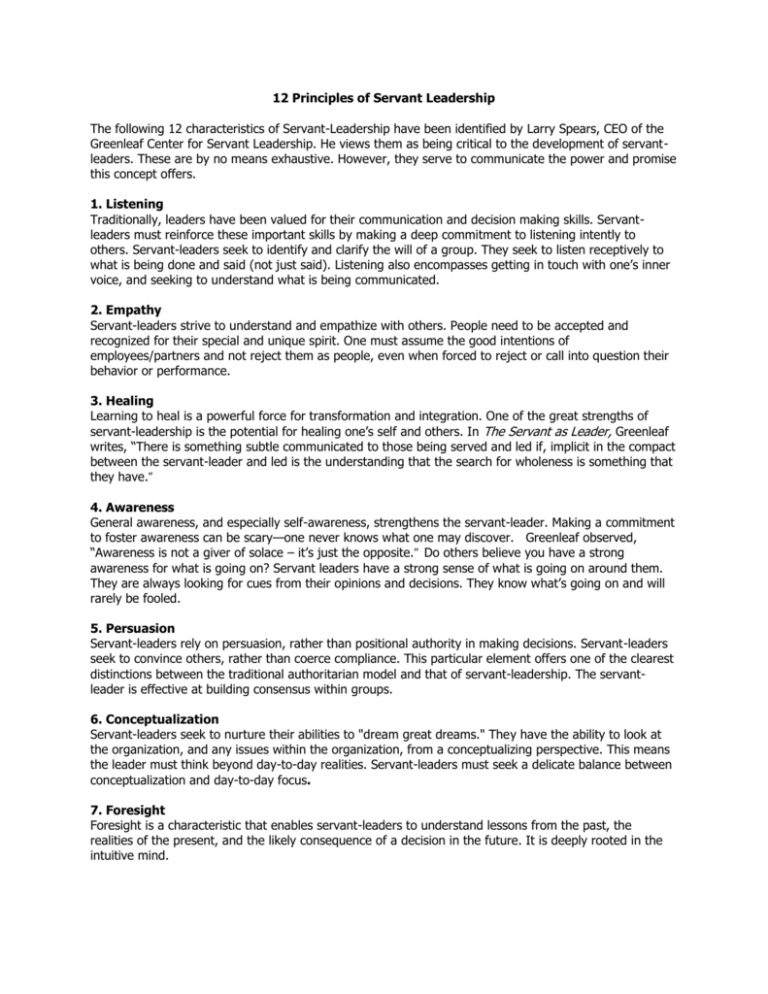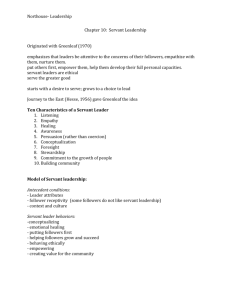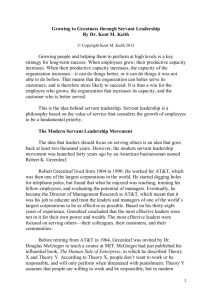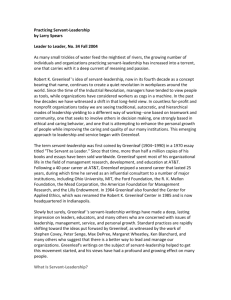12 Principles of Servant Leadership The following 12 characteristics
advertisement

12 Principles of Servant Leadership The following 12 characteristics of Servant-Leadership have been identified by Larry Spears, CEO of the Greenleaf Center for Servant Leadership. He views them as being critical to the development of servantleaders. These are by no means exhaustive. However, they serve to communicate the power and promise this concept offers. 1. Listening Traditionally, leaders have been valued for their communication and decision making skills. Servantleaders must reinforce these important skills by making a deep commitment to listening intently to others. Servant-leaders seek to identify and clarify the will of a group. They seek to listen receptively to what is being done and said (not just said). Listening also encompasses getting in touch with one’s inner voice, and seeking to understand what is being communicated. 2. Empathy Servant-leaders strive to understand and empathize with others. People need to be accepted and recognized for their special and unique spirit. One must assume the good intentions of employees/partners and not reject them as people, even when forced to reject or call into question their behavior or performance. 3. Healing Learning to heal is a powerful force for transformation and integration. One of the great strengths of servant-leadership is the potential for healing one’s self and others. In The Servant as Leader, Greenleaf writes, ―There is something subtle communicated to those being served and led if, implicit in the compact between the servant-leader and led is the understanding that the search for wholeness is something that they have.” 4. Awareness General awareness, and especially self-awareness, strengthens the servant-leader. Making a commitment to foster awareness can be scary—one never knows what one may discover. Greenleaf observed, ―Awareness is not a giver of solace – it’s just the opposite.” Do others believe you have a strong awareness for what is going on? Servant leaders have a strong sense of what is going on around them. They are always looking for cues from their opinions and decisions. They know what’s going on and will rarely be fooled. 5. Persuasion Servant-leaders rely on persuasion, rather than positional authority in making decisions. Servant-leaders seek to convince others, rather than coerce compliance. This particular element offers one of the clearest distinctions between the traditional authoritarian model and that of servant-leadership. The servantleader is effective at building consensus within groups. 6. Conceptualization Servant-leaders seek to nurture their abilities to "dream great dreams." They have the ability to look at the organization, and any issues within the organization, from a conceptualizing perspective. This means the leader must think beyond day-to-day realities. Servant-leaders must seek a delicate balance between conceptualization and day-to-day focus. 7. Foresight Foresight is a characteristic that enables servant-leaders to understand lessons from the past, the realities of the present, and the likely consequence of a decision in the future. It is deeply rooted in the intuitive mind. 8. Stewardship Servant leaders are often characterized by a strong sense of stewardship. Stewardship stems from medieval times when a steward would be assigned to hone the skills and development of the young prince to prepare him for his reign. A steward in an organization is responsible for preparing it for its destiny, usually for the betterment of society. When we describe a leader as having a strong sense of stewardship, we refer to a desire to prepare the organization to contribute to the greater good of society—not unlike preparing the prince to serve the greater good of the kingdom. 9. Growth Do employees believe that you are committed to helping them develop and grow? Servant leaders have a strong commitment to the growth of people. They believe that all employees have something to offer beyond their tangible contributions. Servant leaders work hard to help employees develop in a number of ways. Servant-leaders need to connect to others’ developmental needs and actively find ways to help them reach their true potential as employees. 10. Building Community Do employees feel a strong sense of community? Servant leaders have a strong sense of community spirit and work hard to foster it in an organization. They believe the organization needs to function as a community and work hard to build community within. Servant-leaders are aware that the shift from local communities to large institutions as the primary shaper of humanity has changed our perceptions and caused a sense of loss. Servant-leaders seek to identify a means for building community among those who are part of the organization. 11. Calling Do employees believe that you are willing to sacrifice self-interest for the good of the organization? Servant leaders have a natural desire to serve others. This notion of having a calling to serve is deeply rooted and values-based. The servant leaders desire to make a difference for others within the organization and will pursue opportunities to make a difference and to impact the lives of employees, the organization and the community—never for their own gain. 12. Nurturing the Spirit - JOY!! The servant leader is someone who understands the deep human need to contribute to personally meaningful enterprises. The servant-leader nurtures the individual’s spirit through honest praise and supportive recognition. Criticisms and suggestions are not personal or harsh. The joy of the work is celebrated through means that acknowledge the value of employees’ commitment to worthwhile activities. The servant leader reminds employees to reflect on the importance of both the struggles and successes in the organization and learn from both.











